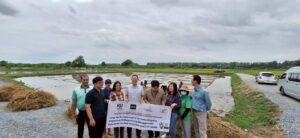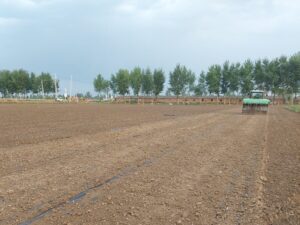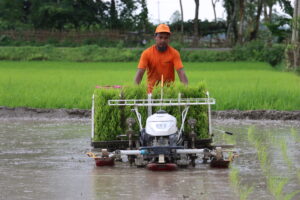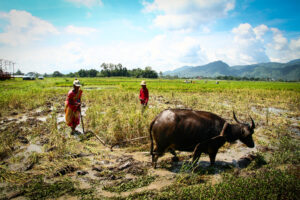LOS BAÑOS, Philippines — Creative ideas and innovative technologies were highlighted at a week-long presentation of research proposals aimed at increasing rice productivity in the face of climate change and shrinking resources.
The 2016 IRRI Science Week, held 18-22 January at the International Rice Research Institute (IRRI), featured 10 major proposals covering overarching themes of climate change, rice technologies for increased profitability, monitoring systems, pest and disease management, increasing productivity in Asian mega-deltas, reinvigorating Myanmar’s rice industry, and optimizing impact acceleration strategies. IRRI scientists presented the proposals, which were then critiqued by their peers and other experts.
“Science Week is a time to reflect on achievements, assess the state-of-the-art, celebrate with donors and partners, and look to the future,” said Matthew Morell, IRRI director general.
A major objective of Science Week 2016 was to polish and package the presented research proposals for submission to potential donors. “IRRI’s research needs to be clear on the problems that it is trying to solve, the impacts of the initiative, how the work is different from what other researchers can contribute, and the target outcomes,” said Morell.
In addition to the proposal presentations, Matty Demont, IRRI senior economist, supervised a research prioritization activity. Participants were asked to adopt a donor’s perspective in evaluating and prioritizing the proposals. The prioritization exercise established research areas that are possibly of more value among donors and where diminishing financial resources can be optimized while achieving greater impact.
Part of this year’s Science Week was devoted to an IRRI-Australia Symposium to emphasize IRRI’s and Australia’s 53 years of collaboration and joint interests in rice research. Since 1963, more than 50 Australian scientists, trustees, and consultants have come to work at IRRI, contributing to the Institute’s research agenda and direction-setting. Currently, two Australians are serving in the Institute’s top leadership: Morell and board of trustees member Kaye Basford.
During the symposium, IRRI and Australian scientists alternated presentations on research topics of mutual interest and concern including photosynthetic efficiency, drought and salt tolerance, and genomics.
One of the highlights was the presentation by John R. Evans, noted plant physiologist at the Australian National University, in which he discussed improving the efficiency of photosynthesis in rice and other crops. Evans is the son of Lloyd T. Evans (1927-2015), renowned Australian plant physiologist, for whom IRRI’s new Australian-funded climate change research facility has been named. The symposium concluded with the dedication of the Lloyd T. Evans Plant Growth Facility, which is destined to become a critical location for climate change research.
Other Australian presenters included Basford, University of Queensland; David Edwards, University of Western Australia, Saul Newman and Steve Swain, Commonwealth Scientific and Industrial Research Organization; and Spencer Whitney, Murray Badger, and Florence Danila, Australian National University.
Since 1960, IRRI has contributed groundbreaking research in rice science and innovative farm management systems to improve the global rice industry and those of many rice-producing countries. From an average yield of 2 t/ha in the 1960s, the figure increased to a hundredfold at the turn of the century. Now, some countries like India and China have achieved much higher yields of up to 10 t/ha.
But now, more than ever, IRRI’s role in shaping rice research cannot be understated as greater challenges like input scarcity, land usage, labor availability, ecological degradation, and climate change confront the rice sector.
In the years ahead, IRRI will secure new donors, build revenue streams for intellectual assets and services, and increase operating efficiency. IRRI’s rice science will continue to be relevant and anchored on solid ground.
“We have great track record, great people, great ideas, and great projects,” Morell concluded. “IRRI remains essential, well-supported, and has a well-stocked pipeline. The Institute will continue to evolve, broaden its support base, thrive, and deliver.”






